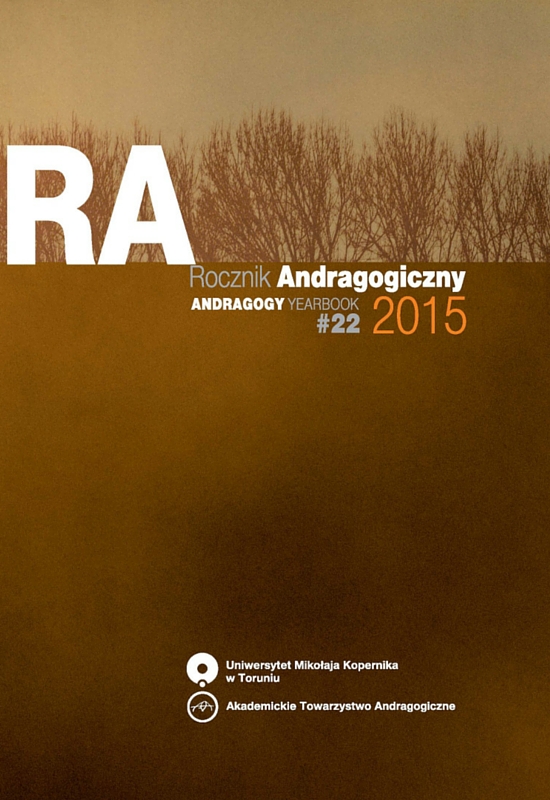What kind of education and for whom? The educational biographies of adults and their social dimensions
DOI:
https://doi.org/10.12775/RA.2015.004Keywords
adult education, adult learning, learning biography, qualitative researchAbstract
This text refers to a discussion on the meanings of adult education, but in a special research context. This context is defined by the analyses of non-traditional students’ biographies oriented on exploring their life experiences treated in their justifications as educational. As a consequence, on the basis of their individual justifications I have reconstructed five types of narrations. These are: “I want to reach more than my parents” (1), “Nowadays we have to adapt to the free market and the progress of the civilized world” (2),“The adult person is clever by nature” (3), “I have to give myself a chance” (4), “I want to be aware of that world I am part of” (5). This work results in the unveiling of the qualities of narration schema, which shows the
use of learning language by interviewed adults and their learning potential at the same time. What is more, all these narrations show that the social roots of the individual explanations have created the learning potential of adults interviewed. In this way I try to refer to the doubts demonstrated by G. J. J. Biesta (2006, 2010) who says that the economic language of learning adapted in the theory of education caused the question about a good education and its social meaning is neglected. The research presented here shows that the social meanings of learning are still an important issue.
References
Alheit P., Podejście biograficzne do całożyciowego uczenia się, „Teraźniejszość – Człowiek – Edukacja” 2011, nr 3 (55).
Bauman T. (2005), Dydaktyczny i społeczny status uczenia się, [w:] T. Bauman (red.), Uczenie się jako przedsięwzięcie na całe życie, Oficyna Wydawnicza Impuls, Kraków.
Bauman T. (2010), Poznawczy status badań jakościowych, [w:] J. Piekarski, D. Urbaniak-Zając, K. J. Schmidt (red.), Metodologiczne problemy tworzenia wiedzy w pedagogice. Oblicza akademickiej praktyki, Oficyna Wydawnicza Impuls, Kraków.
Biesta G. J. J. (2006), Beyond learning. Democratic education for human future, Boulder–London.
Biesta G. J. J. (2010), Good education in an age of measurement. Ethics, politics, democracy, Boulder–London.
Bourdieu P. (2009), Rozum praktyczny. O teorii działania, Wydawnictwo Uniwersytetu Jagiellońskiego, Kraków.
Bruner J., Życie jako narracja, „Kwartalnik Pedagogiczny” 1990, nr 4.
Chase S. E. (2009), Wywiad narracyjny. Wielość perspektyw, podejść, głosów, [w:] N. K. Denzin, Y. Lincoln (red.), Metody badań jakościowych, PWN, Warszawa, t. 2.
Denzin N. K. (1990), Interpretacja metody biograficznej w socjologii: znaczenie a metoda w analizie biograficznej, [w:] J. Włodarek, M. Ziółkowski (red.), Metoda biograficzna w socjologii, PWN, Warszawa–Poznań.
Dominice P. (2006), Uczyć się z życia. Biografia edukacyjna w edukacji dorosłych, Wydawnictwo Wyższej Szkoły Humanistyczno-Ekonomicznej Łódź.
Dubas E., (1993), Linie edukacyjnego rozwoju człowieka, [w:] A. Trzuskowski (red.), Edukacja dorosłych w sytuacji przemian na tle porównawczym, Łódź.
Dubas E. (2002), Rozwój ku dojrzałości (w kontekście autobiograficznych refleksji studentów pedagogiki o specjalności oświata dorosłych, [w:] E. Dubas, O. Czerniawska (red.), Drogi edukacyjne i ich biograficzny wymiar, Wydawnictwo ITEE, Warszawa.
Jurgiel A., Praktyki badawcze obecne w badaniach nad procesami społeczno- kulturowego uczenia się dorosłych. Ujęcie krytyczne, „Edukacja Dorosłych” 2011, nr 1.
Jurgiel A., Walka o zmianę statusu a (nie)moc kształcenia w świetle analizy doświadczeń edukacyjnych kobiet, „Rocznik Andragogiczny” 2011.
Jurgiel-Aleksander A. (2013), Doświadczenie edukacyjne w perspektywie andragogicznej. Studium biograficzno-fenomenograficzne, Wydawnictwo Uniwersytetu Gdańskiego, Gdańsk.
Malewski M., Szkoła i uniwersytet – odmienność społecznych funkcji, odrębność edukacyjnych światów, „Teraźniejszość – Człowiek – Edukacja” 1999, nr 2.
Merrill B., Learning and teaching in universities: perspectives from adult learners and lectures, “Teaching in Higher Education” 2001, Vol. 6, no. 1.
Neuman W. L. (2000), Social research methods. Qualitative and quantitative approaches, Sage - London.
Schütze F., Trajektorie cierpienia jako przedmiot badań socjologii interpretatywnej, „Studia Socjologiczne” 1997, nr 1.
Skibińska E. M. (2006), Mikroświaty kobiet. Relacje autobiograficzne, Wydawnictwo ITEE Warszawa.
Solarczyk-Szwec H., Od kapitału adaptacyjnego do rozwojowego Polaków. Niektóre uwarunkowania zmiany, „Rocznik Andragogiczny” 2013.
Szulakiewicz W., Andragogiki portret zbiorowy w kontekście dyskusji o sensie badań biograficznych, „Rocznik Andragogiczny” 2013.
Usher R., Bryant I., Johnston R. (1997), Adult education and the postmodern challenge. Learning beyond limits, Lawrence and Wishart, London and New York.
Downloads
Published
How to Cite
Issue
Section
License
Copyright (c) 2016 Rocznik Andragogiczny

This work is licensed under a Creative Commons Attribution-NoDerivatives 4.0 International License.
Stats
Number of views and downloads: 943
Number of citations: 0



